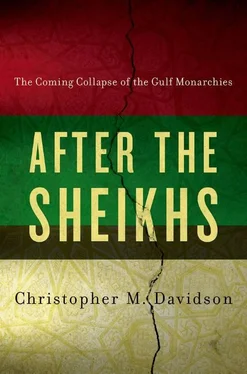38. See for example Spooner, Lysander. ‘No Treason: The Constitution of No Authority’ (1867). In this essay Spooner argues that a genuine social contract cannot include government actions such as taxation because the collection of tax would require the government to initiate force against anyone unwilling to pay.
39. For discussions of expatriates in Dubai and Abu Dhabi see Davidson (2008), chapter 5; Davidson (2009), chapter 6.
40. Herb, Michael, All in the Family: Absolutism, Revolution, and Democracy in the Middle Eastern Monarchies (New York: State University of New York Press, 1999), p. 3. Herb claims in his comparative study of ruling families in the Middle East that the dominance of one large and cohesive family over the state, rather than oil wealth, education, military support, external political support, representative institutions, selective marriages, charismatic rulers, or any other factors is the key to survival.
41. Muhammad Idris Al-Mahdi Al-Senussi.
42. See Herb (1999).
43. Qaboos bin Said Al-Said.
44. See Valeri (2011).
45. For a fuller discussion see Lucas (2004).
46. For further discussion see Filiu, Jean-Pierre, The Arab Revolution: Ten Lessons from the Democratic Uprising (London: Hurst, 2011), p. 3.
47. Muhammad bin Rashid Al-Maktoum.
48. Reuters, 24 June 2010.
49. Gulf News , 29 December 2011.
50. Filiu (2011), p. 58.
51. Muhammad bin Zayed Al-Nahyan.
52. Wikileaks, US Embassy Abu Dhabi, 29 April 2006.
53. Abdullah Al-Ghaddami.
54. Ahmed Mansour Al-Shehhi.
55. Reuters, 24 June 2010.
56. Valbjørn, Morten, and Bank, André, ‘Examining the Post in Post-Democratization: The Future of Middle Eastern Political Rule through Lenses of the Past’, Middle East Critique , Vol. 19, No. 3, 2010, pp. 185–186.
1. STATE FORMATION AND ECONOMIC DEVELOPMENT
1. Peck, Malcolm, The United Arab Emirates: A Venture in Unity (Boulder: Westview, 1986), pp. 29–30.
2. Hawley, Donald, The Trucial States (London: George Allen and Unwin, 1970), pp. 96–97.
3. Belgrave, Charles, The Pirate Coast (London: G. Bell and Sons, 1966), p. 25.
4. The defeat took place in 1818.
5. For a full discussion of the Saudi-Wahhabi alliance see Commins, David, The Wahhabi Mission and Saudi Arabia (London: IB Tauris, 2009).
6. Bin Ali had initiated the 1916 Arab Revolt against the Ottoman Empire. See Teitelbaum, Joshua, The Rise and Fall of the Hashemite Kingdom of Arabia (London: Hurst, 2001), p. 243.
7. Roberts, David, ‘Kuwait’ in Davidson, Christopher M. (ed.), Power and Politics in the Persian Gulf Monarchies (London: Hurst, 2011), p. 89.
8. Muhammad Al-Sabah.
9. For a full discussion see Crystal, Jill, Oil and Politics in the Gulf: Rulers and Merchants in Kuwait and Qatar (New York: Cambridge University Press, 1995), chapter 1.
10. Roberts (2011), p. 90.
11. This took place in 1921.
12. Signed in 1921, the Uqair agreement required Kuwait to give up much of its territory to the Al-Saud, while also defining its borders with the British-mandated territory of Iraq. See Lauterpacht, E., Greenwood, C. J., Weller, Marc, ‘The Determination of Boundaries between Iraq, Kuwait and Saudi Arabia (Najd)’ in The Kuwait Crisis: Basic Documents (Cambridge: Cambridge University Press, 1991), pp. 45–49.
13. See for example Davies, Charles E., The Blood Red Arab Flag: An Investigation into Qasimi Piracy, 1797–1820 (Exeter: Exeter University Press, 1997); Al-Qasimi, Sultan bin Muhammad, The Myth of Arab Piracy in the Gulf (London: Croom Helm, 1986).
14. Nasser Al-Makhdur. The Al-Makhdur family also ruled over Bushire, on the Persian coastline. See Hopwood, Derek, The Arabian Peninsula (London: George Allen and Unwin, 1972), p. 40.
15. The rulers of Trucial States were all given gun salutes by the cannons of visiting British warships. The number of cannon blasts corresponded with Britain’s perception of a ruler’s relative power and influence in the region.
16. During this period Dubai was governed by Muhammad bin Hazza Al-Nahyan and his uncle Zayed bin Saif Al-Nahyan.
17. Davidson, Christopher M., Dubai: The Vulnerability of Success (London: Hurst, 2008), pp. 12–14.
18. See Valeri, Marc, ‘Oman’ in Davidson (2011).
19. See Davidson, Christopher M., The United Arab Emirates: A Study in Survival (Boulder: Lynne Rienner, 2005), pp. 30–31; Gause, Gregory F. Oil Monarchies: Domestic and Security Challenges in the Arab Gulf States (New York: Council on Foreign Relations Press, 1994), p. 22.
20. Lord George Curzon.
21. Al-Sagri, Saleh Hamad, ‘Britain and the Arab Emirates, 1820–1956’ (PhD thesis. University of Kent at Canterbury, 1988), p. 70.
22. Most notably the fratricides among the sons of Abu Dhabi’s Zayed bin Khalifa Al-Nahyan.
23. Al-Sagri, p. 97.
24. Ibid., p. 92.
25. Ibid., p. 51.
26. Lorimer, John G., Gazetteer of the Persian Gulf, Oman, and Central Arabia (London: Gregg International Publishers, 1970), pp. 1450–1451.
27. Al-Sagri, p. 64.
28. Locational rent being a form of economic rent which is created by spatial variation or the location of a resource. The concept was put forward in the 1820s by Johann Heinrich von Thünen. See Von Thünen, Johann Heinrich, The Isolated State (1826). In this case, the sheikhdoms’ location en route to India and the suspected oil reserves in their territories.
29. Buxani, Ram, Taking the High Road (Dubai: Motivate, 2003), p. 84.
30. India Office R/515/4; Abdullah, Muhammad Morsy, The United Arab Emirates: A Modern History (London: Croom Helm, 1978), p. 56.
31. Wilson, Graeme, Rashid’s Legacy: The Genesis of the Maktoum Family and the History of Dubai (Dubai: Media Prima, 2006), p. 72. In the latter case Imperial Airways was allowed to land flying boats in between buoys on the Dubai creek.
Читать дальше












